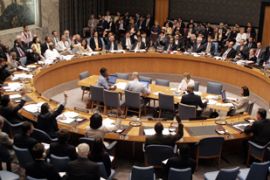UN approves Hariri tribunal
UN approves prosecution of suspected killers of former Lebanese prime minister.

The agreement between the UN and the Lebanese government on the al-Hariri process, that was first announced by Annan last week, would create a tribunal located outside Lebanon with a majority of international judges and an international prosecutor.
Syrian denial
Annan says having more international than Lebanese judges would help ensure the tribunal’s independence.
|
“The draft agreement and the statute of the tribunal will not come into force until… constitutional requirements are met” Nassir Al-Nasser, Qatar’s UN ambassador |
Al-Hariri and 22 others were killed in a lorry bombing in 2005 that provoked huge public protests against Syria, which was widely regarded as being responsible for the attack.
Syria denied involvement, but was later forced to end its 29-year presence in Lebanon and withdraw its troops.
Detlev Mehlis, the first UN chief investigator, said the killing’s complexity suggested the Syrian and Lebanese intelligence services played a role in al-Hariri’s assassination and in one report he implicated Assaf Shawkat, Syria’s military intelligence chief and the brother-in-law of Syrian president Bashar Assad.
His successor, Belgian judge Serge Brammertz, shied away from naming anyone but has described a very complex operation and said he is following many new leads.
 |
|
Al-Hariri was killed in a lorry bombing in 2005 |
The deadline for objections to the letter on Tuesday, was 23:00 GMT -just hours after Gemayel’s killing – but Bolton, along with the French and Qatari ambassadors emerged from the council meeting and announced that the letter had been unanimously approved almost two hours early.
With the Security Council’s green light for Annan to finalise the documents, it will now be up to the Lebanese government to take a final decision on establishing the tribunal.
The government is under pressure from Hezbollah, which has close ties to Syria and Iran, and has demanded to be given more power or threatened street protests.
Questions
The anti-Syrian prime minister, Foud Siniora, and his Council of Ministers approved the tribunal plan on November 13 but the pro-Syrian president, Emile Lahoud, has challenged the ministers’ decision.
Both Russia and Qatar had raised questions about the constitutionality of the agreement to establish the tribunal, because of the differences between the prime minister and president.
But the council agreed Monday that any constitutional issues should be decided by the Lebanese government and not the UN.
Nonetheless, Qatar’s UN ambassador, Nassir Al-Nasser, the only Arab member of the council, while approving the council’s letter to Annan, sent a letter of clarification to the council president with his government’s position.
It states that concluding a UN-Lebanese agreement “requires a constitutional process in Lebanon consisting of many stages not the least important of which is the approval of the president of the Republic of Lebanon and the Lebanese Parliament.”
“The draft agreement and the statute of the Special Tribunal will not come into force until all such constitutional requirements are met,” Al-Nasser wrote in the letter.